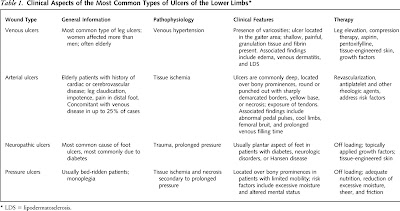Concept:
Any damage to the area of skin and underlying tissue
caused by the prolonged pressure on a hard surface, not necessarily intense,
and independent of the position. 95% of pressure ulcers are preventable.
Pathophysiology:
-
Pressure exerted on an area due to increased
interstitial pressure
-
Friction forces that lead to tissue ischemia
RISK FACTOR:
-
Pathophysiological:
o
Skin lesions
o
Oxygen transport disorders
o
Nutritional deficits
o
Immunological disorders
o
Disturbances of consciousness
o
Motor deficit
o
Alterations elimination
o
Sensory deficit
-
Derivatives of treatment
o
Immobility
o
Drilling
o
Immunosuppressive treatment
-
Situation
o
Poor hygiene
o
Wrinkling
o
Objects of friction
o
Immobility due to pain, fatigue
-
Environment
o
Lack or misuse prevention material
o
Discouragement lack professional training and/or
specific information
o
Work overload
o
Lack of uniform criteria in planning cures
o
Lack of health education for patients and caregivers
o
Deterioration of the image of the disease
NORTON SCALE.
BRADEN SCALE:
GRADES:
TYPES OF ULCERS;
CARE:
Personal reflection:
Due to the
impact on the patient, the role of prevention in nursing is very important.
Report risk
factors the patient, to prevent a major problem risk.
BIBLIOGRAPHY:
Grupo nacional para el estudio y asesoramiento en ulceras por presion y heridas cronicas (GNEAUPP). Directrices generales sobre tratamiento de las ulceras por presion. 2003
Ulceras por presion. Medline pluss. Biblioteca nacional de EEUU. Institutos nacionales de salud. 2012. Revisado en: http://www.nlm.nih.gov/medlineplus/spanish/pressuresores.html




No hay comentarios:
Publicar un comentario